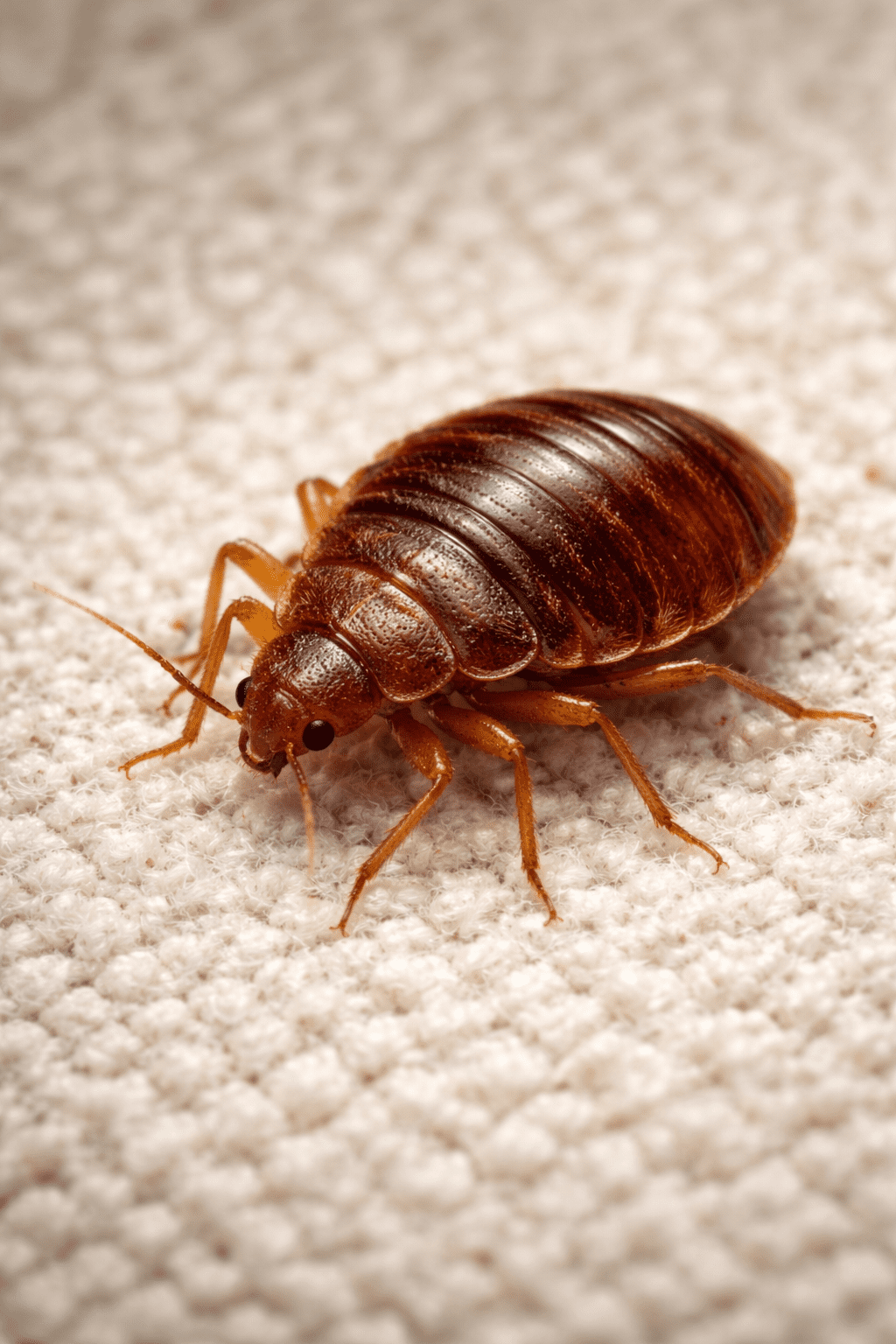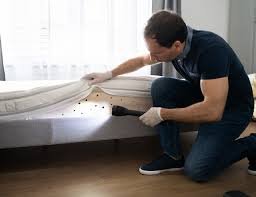
Bed bugs are a common and persistent problem. They can infest homes, hotels, and even public transportation.These tiny pests are not just a nuisance. They can cause allergic reactions, sleep disturbances, and significant stress.
Professional bed bug extermination is often the most effective approach. But what does a bed bug exterminator do exactly?
Bed bug exterminators are trained professionals. They specialize in identifying, treating, and preventing bed bug infestations.Their work involves thorough inspections, customized treatment plans, and follow-up services. They use a variety of methods, from heat treatments to chemical applications.
The Bed Bug Challenge
Bed bugs present a unique challenge. They are small, nocturnal creatures that feed on human blood. Their bites often cause itching and discomfort, which can be disturbing and affect sleep quality.
These pests have a knack for hiding. They nestle into cracks, furniture seams, and even electrical outlets. Their elusive nature makes them hard to spot and even harder to eliminate without expertise.
Moreover, bed bugs reproduce quickly. A female can lay hundreds of eggs during her lifetime. This rapid reproduction can lead to large infestations in a short time. Therefore, tackling a bed bug problem requires swift and comprehensive action. Professional intervention ensures thorough treatment and reduces the chances of re-infestation, making it essential for effective bed bug management.
What Does a Bed Bug Exterminator Do?
A bed bug exterminator is a specialist in bed bug removal. They are trained professionals who focus on identifying and eradicating bed bug infestations.
These experts start with a detailed inspection. This helps them locate the bed bugs and assess the severity of the infestation. Skilled at using various techniques, they ensure an accurate identification.
An essential part of their role involves educating clients. Exterminators teach clients about bed bug behavior and how to prevent future invasions. This education is crucial for long-term pest control.
Following the inspection, exterminators develop a customized treatment plan. They tailor this plan to the specific needs and extent of the infestation. The goal is effective eradication with minimal disruption.
The extermination process often involves several methods:
- Heat treatment: This method uses high temperatures to eliminate bed bugs at all life stages.
- Chemical treatments: Insecticides designed for bed bugs target the pests effectively.
- Mechanical methods: These include vacuuming and steam cleaning to remove bed bugs.
After treatment, exterminators follow up to ensure success. They might offer additional support, depending on the situation. Thus, their work is thorough and comprehensive, providing effective pest control solutions.
Initial Inspection and Identification
The initial inspection is a critical step. Exterminators use this phase to determine the infestation’s scope. It involves careful examination of common bed bug hideouts.
During an inspection, professionals use various tools. These may include flashlights, magnifying glasses, and detection kits. Some even employ trained canine units for enhanced detection accuracy.
They look for telltale signs of bed bug presence. These signs include blood spots, fecal stains, and shed skins. Discovering these indicators is vital to planning an effective strategy.
Exterminators also inspect areas such as beds, furniture, and carpet edges. Bed bugs tend to hide in these places, making thoroughness essential. They must evaluate the infestation comprehensively to decide on the best action.
This detailed inspection forms the foundation for the treatment plan. A precise identification ensures that exterminators tackle the root of the problem. Proper identification is the first step toward successful bed bug removal.
Developing a Customized Treatment Plan
Once the inspection is complete, exterminators craft a customized treatment plan. This plan is unique to each situation. It focuses on addressing the infestation effectively and efficiently.
The chosen treatment depends on several factors. These include the infestation’s size, location, and the client’s preferences. Exterminators carefully consider each aspect to tailor the treatment accordingly.
Various methods may be employed in combination. This multifaceted approach increases the likelihood of complete eradication. Effective plans blend different methods for optimal results.
During this process, exterminators communicate openly with clients. They explain the proposed plan and address any questions. Client involvement is crucial in ensuring the plan’s success and cooperation.
A well-designed treatment plan is essential. It guides the extermination process and maximizes its effectiveness. Tailored approaches are key to successful bed bug elimination and lasting peace of mind.
Heat Treatments Explained
Heat treatments are a favored method for dealing with bed bugs. This approach involves raising the temperature in affected areas. High temperatures are lethal to bed bugs, targeting all life stages.
This method offers several advantages. It is non-toxic and leaves no chemical residues. Thus, it is an eco-friendly choice for many seeking bed bug removal.
Heat treatment is efficient. It requires less time than traditional methods, which is appealing to busy clients. Exterminators use specialized equipment to ensure consistent and effective heating.
However, heat treatment demands precision. Proper equipment and expert handling are crucial. Trained exterminators ensure safety during the process, minimizing risks.
Chemical and Non-Chemical Treatments
Chemical treatments often complement other methods. Specialized insecticides are used to target and eliminate bed bugs. Exterminators select the most effective chemical solutions for each case.
Non-chemical treatments may include the use of mechanical methods. These methods do not rely on chemicals, making them a safer option for some. Such approaches are environmentally friendly and effective.
Here are some common methods used:
- Insect growth regulators (IGRs): These disrupt the bed bug life cycle, preventing reproduction.
- Desiccant dusts: These powders dry out and kill bed bugs through physical effects, not chemical ones.
- Essential oils and plant-based products: Some exterminators offer natural options that repel bed bugs without chemicals.
Chemical treatments require expert application. Exterminators handle these substances carefully to ensure safety. They adhere to regulations, protecting both the client and environment.
Non-chemical methods often support chemical treatments. Together, they provide a comprehensive approach. This combination can be more effective than either method alone.
Mechanical and Physical Methods
Mechanical and physical methods are hands-on approaches to bed bug extermination. These methods are integral in comprehensive pest control strategies.
Vacuuming is a common method used. Exterminators vacuum surfaces to remove visible bed bugs. This immediate action helps control the population quickly.
Steam cleaning offers another effective solution. High-temperature steam kills bed bugs on contact. It penetrates fabrics and crevices where bed bugs hide, providing a thorough clean.
Physical barriers, such as mattress encasements, play a role too. Encasements trap bed bugs, preventing them from spreading. They are an essential tool for maintaining a bed bug-free environment.
Together, these methods address different infestation aspects. They complement chemical treatments, offering a multifaceted approach. This combination ensures thorough pest control for affected areas.
Education and Prevention
Education is key to preventing future infestations. Bed bug exterminators educate clients on how to avoid re-infestation. This knowledge empowers individuals to take proactive steps.
Exterminators suggest preventive measures like reducing clutter. Clutter creates hiding spots for bed bugs, so minimizing it helps. They also recommend sealing cracks and crevices to eliminate entry points.
Regular monitoring is advised as part of prevention strategies. Exterminators guide clients on signs to watch for. Early detection helps prevent a full-blown infestation from taking root.
Prevention education is an integral service. It ensures that the client remains vigilant. Long-term prevention requires awareness and proactive measures from all involved.
The Importance of Professional Pest Control
Professional pest control is crucial in managing bed bug infestations effectively. Experts have the tools and knowledge required to eliminate bed bugs. Their experience ensures thoroughness in both identifying and eradicating the pests.
Without a professional approach, infestations can worsen. Bed bugs are notorious for being resilient, often surviving DIY treatments. Professionals know which techniques work best, ensuring successful bed bug removal.
Additionally, professional pest control provides peace of mind. Clients can trust that the problem will be handled discreetly and efficiently. This confidence is invaluable in maintaining a bed bug-free environment.
Why DIY Bed Bug Removal Often Fails
DIY bed bug removal is usually ineffective. Bed bugs have developed resistance to many over-the-counter products. This resilience makes them difficult to eradicate without professional intervention.
Incorrect application of DIY methods can lead to a larger infestation. Bed bugs spread quickly, and inadequate treatments allow them to proliferate. Trying to manage this on your own often results in frustration and increased costs.
Moreover, DIY attempts lack the thoroughness of a professional service. Exterminators use a combination of methods, targeting the problem from multiple angles. This comprehensive approach is essential for real, long-lasting results.
The Cost-Effectiveness of Hiring an Exterminator
Hiring an exterminator may seem costly, but it can save money in the long run. Professionals provide a thorough service, reducing the chance of re-infestation. This minimizes future expenses on additional treatments or damaged property.
Exterminators are efficient, handling the problem quickly. Their expertise ensures that the work is done right the first time. This efficiency saves time and reduces disruption to daily life.
Ultimately, the peace of mind offered by professional services is invaluable. Knowing the problem is addressed comprehensively allows clients to relax. The investment in professional pest control proves to be worthwhile in maintaining a comfortable and pest-free home.
After the Extermination: Follow-Up and Prevention
Once extermination is complete, follow-up is crucial. Exterminators monitor treated areas to ensure success. This involves checking for any signs of remaining bed bugs.
Consistency in follow-up helps maintain a pest-free environment. Professionals may schedule additional visits if necessary. These visits address any residual issues or potential re-infestations.
Prevention is also a key part of the process. Exterminators provide advice on how to avoid future infestations. Clients learn practical tips to keep their homes protected long-term.
Monitoring and Follow-Up Treatments
Monitoring is an essential part of successful bed bug control. Exterminators use various tools to check for bed bug activity. This ensures that no bugs survive the initial treatment.
Follow-up treatments may be necessary. These are scheduled based on the severity of the initial infestation. Additional treatments fortify the first round, ensuring all pests are eliminated.
During these visits, exterminators reassess the situation. They adapt their strategies as needed for continued effectiveness. This approach guarantees comprehensive bed bug removal.
Long-Term Prevention Strategies
Implementing long-term prevention strategies is vital. Professional exterminators offer guidelines tailored to each client. These strategies help protect against future infestations.
Simple steps like reducing clutter and sealing cracks are effective. They eliminate potential hiding spots for bed bugs. Such measures play a significant role in deterring new colonies.
Regular inspections are another key strategy. They help catch any issues early, preventing bigger problems. With these proactive measures, maintaining a bug-free home becomes manageable.
Choosing the Right Bed Bug Exterminator
Selecting the right exterminator involves careful consideration. Not all professionals offer the same level of service. Knowing what to look for can make the process smoother.
Quality exterminators should have certain traits. These include experience, proper credentials, and a good track record. It’s critical to check reviews and ask for referrals.
Comparison shopping is also recommended. Different companies may offer varied approaches and warranties. Choosing wisely can save time, money, and stress in the long run.
Licensing and Certification
Licensing ensures that exterminators meet industry standards. Certified professionals adhere to safety regulations. This is vital for safe and effective bed bug removal.
Before hiring, verify their credentials. Most reputable exterminators openly provide this information. This assurance helps ensure quality pest control services.
Experience and Reputation
An exterminator’s experience speaks volumes. Years in the business often translate to expertise. A seasoned professional is familiar with diverse infestation scenarios.
Reputation is equally important. Positive reviews indicate past success and satisfaction. Seek exterminators known for their reliability and efficiency.
The Exterminator’s Approach to Integrated Pest Management (IPM)
IPM is a holistic method for pest control. It combines various tactics to manage infestations sustainably. A good exterminator embraces this comprehensive strategy.
Discuss the exterminator’s approach to IPM. Ensure they use environmentally friendly methods when possible. This shows a commitment to effective, long-term pest management.
Choosing the Right Bed Bug Exterminator for Your Needs
Understanding what a bed bug exterminator does is key to effective pest management. These professionals not only remove bed bugs but also help prevent future infestations.
Investing in professional services provides peace of mind and safety. For anyone dealing with bed bugs, hiring an experienced exterminator ensures a thorough and lasting solution.
What Does a Bed Bug Exterminator Do FAQ Commonly Asked Questions Answered
What does a bed bug exterminator do in Canada?
A bed bug exterminator in Canada uses specialized techniques and tools to locate, treat, and eliminate bed bugs. They often employ heat treatments, pesticides, or a combination of methods to eradicate these pests from homes or businesses.
How do bed bug exterminators detect infestations?
Exterminators use visual inspections, bed bug detection dogs, and sometimes thermal imaging to find bed bugs in hidden areas such as cracks, crevices, or behind furniture.
Are bed bug extermination services guaranteed?
Many bed bug exterminators in Canada offer a guarantee for their services, ensuring that if the infestation persists, they will return to re-treat the property at no extra charge.
What is the most effective treatment for bed bugs?
Heat treatment is often considered the most effective method because it can kill bed bugs in all life stages. However, a combination of chemical treatments and physical methods, like vacuuming, may also be used.
How long does a bed bug exterminator take to eliminate an infestation?
The timeline can vary, but depending on the severity and treatment methods, exterminators usually need between 1 and 3 visits to completely eliminate a bed bug infestation.
Is bed bug extermination safe for pets and children?
Reputable exterminators use safe treatments for pets and children, mainly when using heat or low-toxicity pesticides. Always check with the exterminator beforehand.
How much does it cost to hire a bed bug exterminator in Canada?
The cost of hiring an exterminator can range from $500 to $2,000 CAD, depending on the size of the infestation, the treatment method, and the property’s location.
Do I need to prepare my home before the exterminator arrives?
Yes, preparation is crucial. To ensure thorough treatment, exterminators may ask you to vacuum the area, launder bed linens, and remove clutter.
Can bed bugs come back after extermination?
While bed bugs can be eradicated with proper treatment, they can return if reintroduced through second-hand furniture, travel, or other means. Post-treatment prevention measures are recommended.
How can I prevent a bed bug infestation in the future?
To prevent future infestations, avoid picking up used furniture, inspect hotel rooms while traveling, regularly inspect your home for signs of bed bugs, and seal cracks and crevices where bed bugs could hide.
Why is BP Pest Control the best choice for bed bug extermination in Canada?
BP Pest Control is renowned for its expertise and commitment to providing effective, eco-friendly solutions for bed bug infestations. With years of experience and a team of certified professionals, BP Pest Control uses the latest technologies and methods to ensure complete eradication and prevent future infestations.
What makes BP Pest Control different from other bed bug exterminators?
BP Pest Control stands out by offering personalized service, advanced treatments like heat remediation, and a strong focus on customer satisfaction. Their team is highly trained, and they provide thorough inspections and follow-up treatments to ensure long-term results
Does BP Pest Control offer a guarantee for bed bug extermination?
Yes, BP Pest Control offers a satisfaction guarantee for their bed bug extermination services. They ensure that the problem is fully addressed and will return for re-treatment if necessary, providing peace of mind to homeowners dealing with bed bug infestations.
Is it possible to 100% get rid of bed bugs?
hile it’s challenging to guarantee 100% eradication, with the right treatment methods and professional help, bed bugs can be effectively eliminated. Thorough treatments, including heat remediation, chemical solutions, and vacuuming, can eliminate bed bugs in all life stages, but follow-up treatments may be necessary to ensure full eradication.
How do you get rid of bed bugs in Canada?
In Canada, bed bug extermination typically involves a combination of methods like chemical treatments, heat treatment, and steam cleaning. Professional exterminators will inspect your home, use heat or pesticides, and possibly use follow-up treatments to ensure bed bugs are completely eradicated.
What is the success rate of bed bug extermination?
The success rate for bed bug extermination is generally high, especially with professional services. Success depends on factors like the severity of the infestation, the methods used, and how quickly the problem is addressed. Many reputable exterminators report a success rate of 95% or higher after treatment, with follow-up sessions improving the results.
Bed bug exterminator Toronto
In Toronto, well-known pest control companies like Orkin Canada, BP Pest Control, and Pest Control Toronto offer effective bed bug extermination services. They typically employ a combination of heat treatments, chemical solutions, and follow-up visits to ensure complete eradication of bed bugs.



